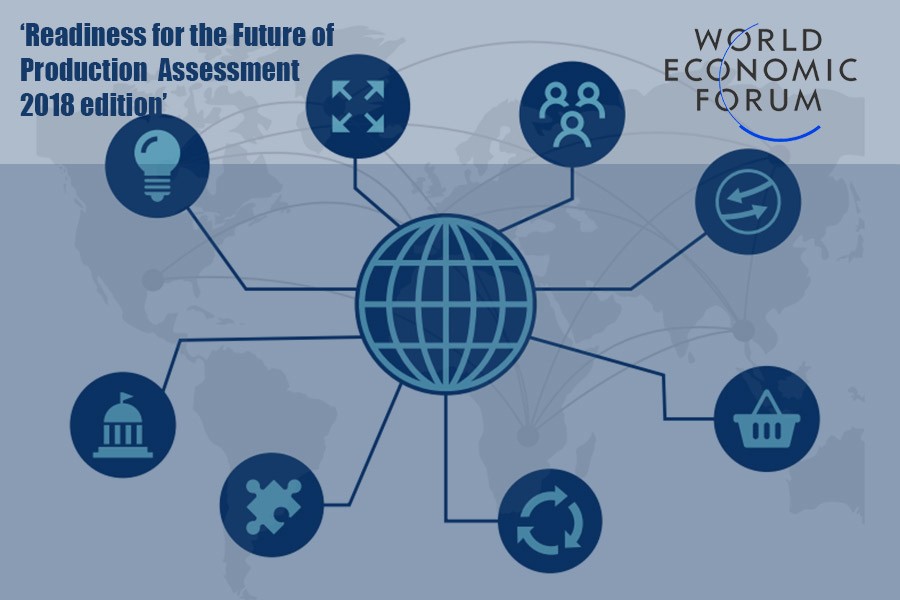Bangladesh has been positioned as the poorest performer among its South Asian neighbours in a latest worldwide ranking.
The Switzerland-based World Economic Forum (WEF) has published the evaluation titled ‘Readiness for the Future of Production Assessment 2018 edition’.
While Bangladesh was placed on as low as 80th position in the report – also dubbed as the global manufacturing index – covering a total of 100 countries from across the world, its closest neighbour India was ranked at 30th position.
Among other South Asian neighbours on the chart, Sri Lanka was ranked 66th with Pakistan coming next at 74th – only to be followed by Bangladesh at the bottom (80th) of the regional rivals.
Having a score of 3.59 in the ‘Structure of Production’ measurement, Bangladesh was placed in the list of ‘Nascent Countries’ alongside the two fore-mentioned regional neighbours with scores of 4.10 (Sri Lanka) and 3.82 (Pakistan).
Bangladesh and Pakistan were also found to be languishing at 89th and 93rd with scores of 3.67 and 3.60 on the ‘Drivers of Production’ scale.
Bangladesh’s overall performance was marked by scores in the index components of multi-stakeholder collaboration (100th), Venture capital deal volume per size of economy (99th), Ability to Innovate (97th), Internet users (97th), Impact of ICTs on new services and products (94th), Mobile-cellular telephone subscriptions (94th), FDI and technology transfer (88th) and LTE mobile network coverage (67th).
Japan came on top of the chart following development of the best structure for production.
The Asian leader on the list was followed by South Korea, Germany, Switzerland, China, Czech Republic, USA, Sweden, Austria and Ireland in the bracket of top 10 countries.
The report also categorised 100 countries in four major groups for its ranking.
The categories include -- Leading (strong current base, high level of readiness for future), High Potential (limited current base, high potential for future), Legacy (strong current base, at risk for future), and Nascent (limited current base, low level of readiness for future).
South Asian giant India scored 5.99 in ‘Structure of Production’ measurement to be placed in the 'Legacy' group alongside Hungary, Mexico, Philippines, Russia, Thailand and Turkey, among others.
China figures among 'leading countries', while Brazil and South Africa are among the 'nascent' ones.
The 25 'leading' countries on the list are in the best position to gain as production systems stand on the brink of exponential change, the WEF said in the report that’s been published ahead of its annual meeting in Davos, Switzerland later this month.
At the same time, it was also mentioned that no country has reached the frontier of readiness – let alone harnessing the full potential of the fourth industrial revolution in production.
The countries ranked better than India include Thailand, Malaysia, Mexico, Israel, the Philippines and Spain.
In a separate list of best positioned to capitalise on the fourth industrial revolution to transform production systems, USA has been ranked on the top, followed by Singapore, Switzerland, the UK and the Netherlands in the top five.
"Every country faces challenges that cannot be solved by the private sector or public sector alone. New approaches to public-private collaboration that complement traditional models are needed to help governments quickly and effectively form partnerships that unlock new value," said the report.


